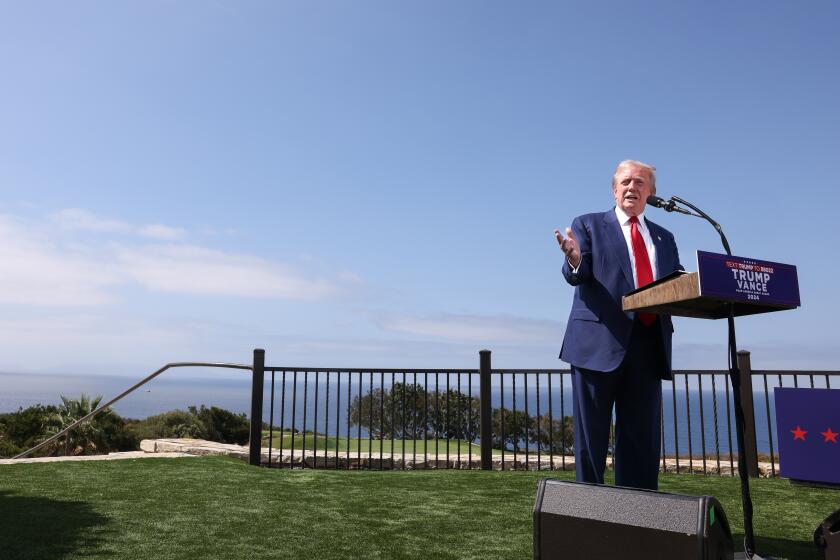Signs of Mounting Pressure on Bush
If past is precedent, President Bush is probably in no mood to go along with the sweeping call for intelligence reform issued this week by the commission investigating the Sept. 11 attacks.
Bush and his staff have shown they don’t like new ideas forced on them from outside. Over and over again the president has resisted pressure for reform from Congress and the public until it became overwhelming.
He resisted a congressional push to establish a Cabinet-level Department of Homeland Security. He resisted calls to come down on corporate malfeasance. He even resisted forming the Sept. 11 commission, and, once its work was underway, White House staff dragged their feet on providing documents and approving testimony by presidential advisors.
So the tepid White House response to the commission’s report -- Bush praised the panel but did not endorse its recommendations -- surprised few in the capital this week.
“What Bush would like to do is say nice things about how constructive this report is and hope that it goes away,” said Norman Ornstein, an observer of relations between the White House and Congress affiliated with the predominantly conservative American Enterprise Institute.
If it doesn’t go away, the president’s usual pattern is to quietly shift course, claiming the idea as his own and proceeding as if he hadn’t resisted it in the first place. Aides insist that the president hasn’t flip-flopped and that his policy has been consistent throughout.
In the past, that reversal has taken weeks and months. It wasn’t until February, nearly a year after the Iraq war had begun, that Bush agreed to let an independent commission examine the intelligence failures that led to false claims about Iraq’s weapons programs.
But there are signs that pressure will mount faster on the White House this time.
In private conversations with the White House on Friday, congressional leaders expressed disappointment with the administration’s initial response and urged that the president try to get out in front of the issue. Late in the day, a White House official said the president had ordered his chief of staff to form an internal task force to review the recommendations.
Observers saw it as a sign that the message was getting through faster than usual.
“With homeland security ... it took them eight months to come around,” said one congressional staffer, who spoke on condition of anonymity. “But with this ... the president will want to be seen as doing everything in his power before the election.”
The commission report puts the president in a bind.
Many of its recommendations can be implemented by executive order, making it more difficult for the president to delay acting or pass responsibility to Congress. And he was clearly keeping his options open. Bush did not embrace the panel’s recommendations, but pointedly did not oppose them.
Commission Vice Chairman Lee H. Hamilton described the president as open-minded. “I think there is a lot of interest at the White House,” he told reporters Friday.
The report comes at an awkward time for the president. With just over three months until the Nov. 2 election, Bush and his staff are preoccupied with the campaign, which is picking up steam, and the situation in Iraq, which he needs to keep under control. Tackling major government reform was not on the agenda.
One result is that the report has cast a pall over the president’s vacation plans. Bush arrived at his Texas ranch on Friday for six days of rest during the Democratic Party convention. Administration officials acknowledged that the president and his top advisors now planned to spend a significant chunk of the time studying the report and considering their options.
Bush already had cut back his usual monthlong vacation to the six days at the ranch, a weekend in Maine at the beginning of August and a week during the Olympics later that month.
White House aides took pains Friday to insist that the president was working even when he was on vacation. They emphasized that national security advisor Condoleezza Rice would be with him for much of the time at the ranch.
“This will continue to get extra attention,” White House spokesman Trent Duffy said.
Ornstein suggests that it’s only a matter of time before the president gives in. That moment will come sooner, he said, if his Democratic challenger, Massachusetts Sen. John F. Kerry, adds his voice to those of the commissioners and Congress and makes intelligence reform a battle cry.
“When you get Bush in a position where it looks like he’s dragging his feet, he will turn on a dime,” Ornstein said. “Given the commitment of the commission to follow up, given the commitment of [Congress] ... it’s inevitable.
“If I were advising the president I would say, ‘Embrace this thing today,’ ” he added. “ ‘Praise the commission to the skies and say, we’ll do it.’ But that’s not his style.”
*
Times staff writers Mary Curtius and Doyle McManus in Washington contributed to this report.
More to Read
Get the L.A. Times Politics newsletter
Deeply reported insights into legislation, politics and policy from Sacramento, Washington and beyond. In your inbox three times per week.
You may occasionally receive promotional content from the Los Angeles Times.










